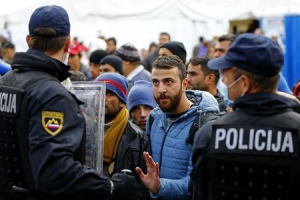From Portugal to Sweden, European countries are becoming harder to govern, and economic reforms more difficult to implement, as a prolonged financial crisis bequeaths a fragmented political landscape with weaker and more divided governments.
The arrival of a wave of refugees and migrants fleeing war, repression and poverty in the Middle East, Asia and Africa may even amplify those political trends, boosting anti-immigration populists and sapping the traditional parties of government.
The center-right was the main electoral beneficiary of the euro zone's financial crisis before the migration surge struck, but it faces increased pressure to adopt the discourse and policies of resurgent far-right Eurosceptic groups.
"Despite a return to economic growth - fragile in some cases - the demand for political alternatives is ever stronger," said Tina Nelson, chief global political analyst at U.S. bank Citi. "They key driver is a deficit of trust, not just in governments but in elites more generally."
In West European elections this year, center-right parties that have implemented austerity policies have mostly come out on top, with the exception of Greece, but have often been weakened by losing votes and seats.
But votes in Canada on Monday and Poland next Sunday - if polls on the latter are to be believed - show that economic success is not necessarily rewarded politically. Instead, anxiety about immigration is trumping economics in many European countries as the driver of electoral behavior.
"For the next cycle of European elections, it's not 'the economy, stupid'; it's 'immigration, stupid'," Fordham said, referring to Bill Clinton's successful 1992 campaign strategy for winning the U.S. presidency by focusing on economics.
The erosion of high levels of support for conservative German Chancellor Angela Merkel over the refugee crisis, and the continuing rise of public backing for anti-immigration National Front leader Marine Le Pen in France highlight this trend.
GOING TO EXTREMES
An academic study analyzing more than 800 elections after periods of financial crisis in 20 advanced economies over the past 140 years gives historical context to the political polarization and the erosion of dominant two-party systems visible in today's post-crisis Europe.
The research paper for Munich's ifo institute called "Going to Extremes: Politics after Financial Crisis, 1870-2014" by Manuel Funke, Moritz Schularick and Christoph Trebesch shows how past banking upheavals led to periods of weak government that made crisis resolution more difficult.
"Our key finding is that policy uncertainty rises strongly after financial crises as government majorities shrink and polarization rises," they write, referring to cases in Europe in the 1920s and 1930s and examples such as the aftermath of the Scandinavian banking crises of the late 1980s and early 1990s.
"After a crisis, voters seem to be particularly attracted to the political rhetoric of the extreme right, which often attributes blame to minorities or foreigners."
On average, far-right parties increased their vote share by 30 percent in the five years after a financial crisis, the data show.
After financial crises, voters are systematically lured by the political rhetoric of the far right, with frequently nationalistic or xenophobic tendencies, the authors say. Greater political fragmentation makes governing harder, and there is usually a dramatic increase in street protests.
The coincidence of the arrival of the largest wave of refugees since the aftermath of World War Two with a sluggish recovery from the euro zone debt crisis makes such trends more likely this time, although mass protests have so far been circumscribed by political apathy and growing individualism.
WEAK GOVERNMENTS MUDDLING THROUGH
In the key crisis states, Spain, Portugal and Greece, the radical left has grown more since 2010 than the far right, largely due to taboos left by past periods of fascist rule.
But there too, the mainstream parties that dominated politics for decades are shrinking, making coalition-forming harder and raising the prospect of unstable minority cabinets.
Portugal's center-right coalition fell short of an outright majority this month and the opposition Socialists, who could only make minor gains, are exploring whether to ally with Communist and radical left parties to take power.
Spanish Prime Minister Mariano Rajoy's conservative Popular Party looks set to fall well short of a majority in a Dec. 20 election but may cling on as a fragile minority administration, given the weakness of the main opposition Socialist party.
In Sweden, Socialist Prime Minister Stefan Lofven leads an unstable minority government dependent on the acquiescence of center-right parties that withdrew from a budget pact with him this month but won't team up with the far-right anti-immigration Sweden Democrats to oust him.
Finland, on the other hand, has an uneasy coalition in which the populist anti-immigration Finns use their role as junior partners to seek to harden policy on refugees.
The weakness of many European governments will as a rule make it harder for them to win social acceptance for integrating large numbers of refugees, making more clashes with EU partners likely over sharing the financial and human burden.
"One year after the beginning of a new political cycle, the EU and its members are again in fire-fighting mode," said Janis Emmanouilidis, director of studies at the European Policy Centre in Brussels.
They lack the political capital to make bold reforms of the euro zone or of the bloc's asylum and immigration policies that many experts see as necessary.
Instead, the most that can be expected from the EU for the next couple of years is "reactive and protective muddling through", Emmanouilidis said.
(Writing by Paul Taylor; editing by Mark John)

















